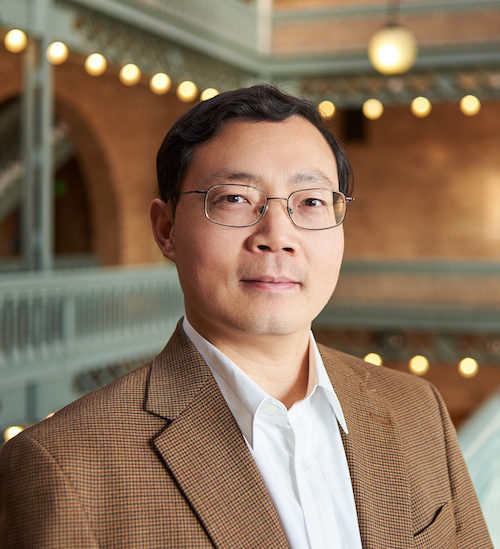Date: Tuesday, April 26, 2022
Time: 11:00 am
Location: Chemla Room (67-3111) and Zoom
Talk Title: Smart thermal infrared regulation with metal-insulator transition
Zoom Recording

Abstract:
As a textbook example of strongly correlated electron material, vanadium dioxide (VO2) features a metal-insulator transition (MIT) when temperature drops below 67oC. The physics of the MIT has challenged physicists for decades, while the potential of the MIT has inspired researchers for a wide range of applications. In this lecture, I will talk about two of our recent works. On the fundamental side, we have revealed novel charge dynamics of VO2 by investigating its electronic thermal conductivity across the MIT [Science, 355, 371(2017)]. An unusually low electronic thermal conductivity was found, and different from previously established conduction mechanisms, it is a signature of the absence of quasiparticles in a strongly correlated electron fluid where heat and charge diffuse independently. On the applied side, we have developed new applications of VO2 for smart regulation of thermal infrared radiation, including a platform where thermal emissivity can be engineered for infrared camouflaging [Advanced Materials, 32, 1907071 (2020)], a thermal imaging sensitizer that achieves milli-Kelvin resolution of thermography at room temperature [Science Advances, 6, eabd8688 (2020)], and a temperature adaptive radiative coating for all-season household thermal regulation [Science, 374, 1504 (2021)].
Bio:
Professor Junqiao Wu received a B.S. from Fudan University and a M.S. from Peking University, China, both in physics. He obtained a Ph.D. degree in Applied Science and Technology from the University of California, Berkeley for work on nitride semiconductors and highly mismatched semiconductor alloys. He did postdoctoral research in the Department of Chemistry and Chemical Biology at Harvard University on phase transitions in transition metal oxide nanomaterials. He began his faculty appointment in the Department of Materials Science and Engineering at the University of California, Berkeley in 2006. His honors include the Berkeley Fellowship, the 29th Ross N. Tucker Memorial Award, the U.C. Regents’ Junior Faculty Fellowship, the Berkeley Presidential Chair Fellowship, the US-NSF Career Award, the US-DOE Early Career Award, the Presidential Early Career Award for Scientists and Engineers (PECASE) from the White House, the Outstanding Alumni Award from Peking University China, the Bakar Faculty Fellows Award, and elected Fellow from the American Physical Society (APS).
The Wu group explores novel properties and applications of strongly correlated electron materials with reduced dimensions, phase transitions at the nanoscale, and optoelectronic, thermal and thermoelectric properties of semiconductor alloys and interfaces.

